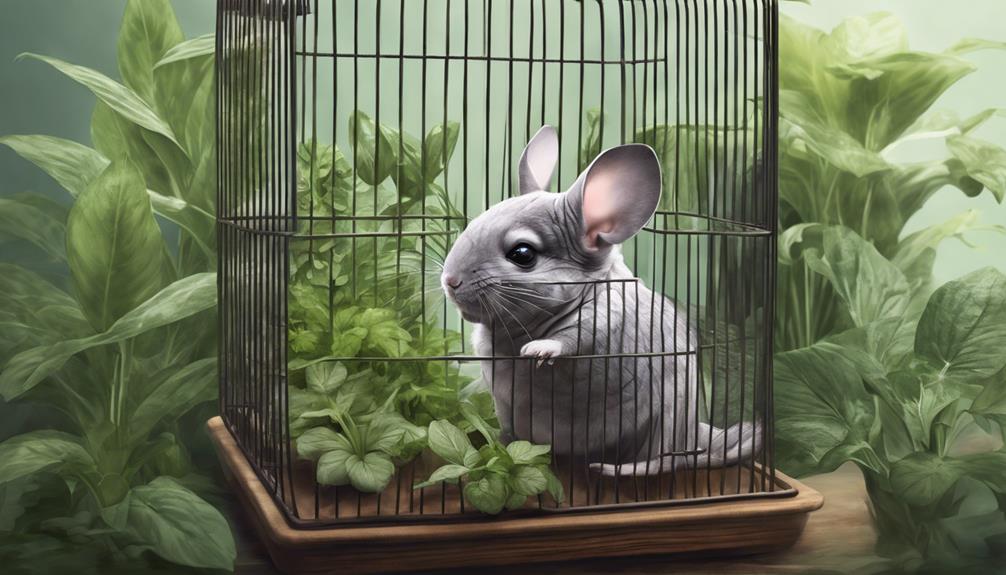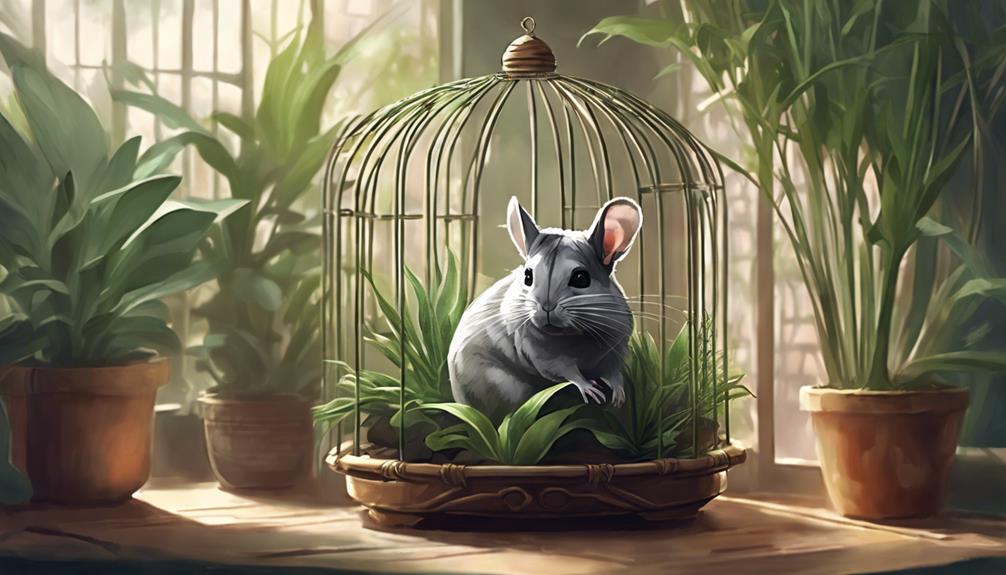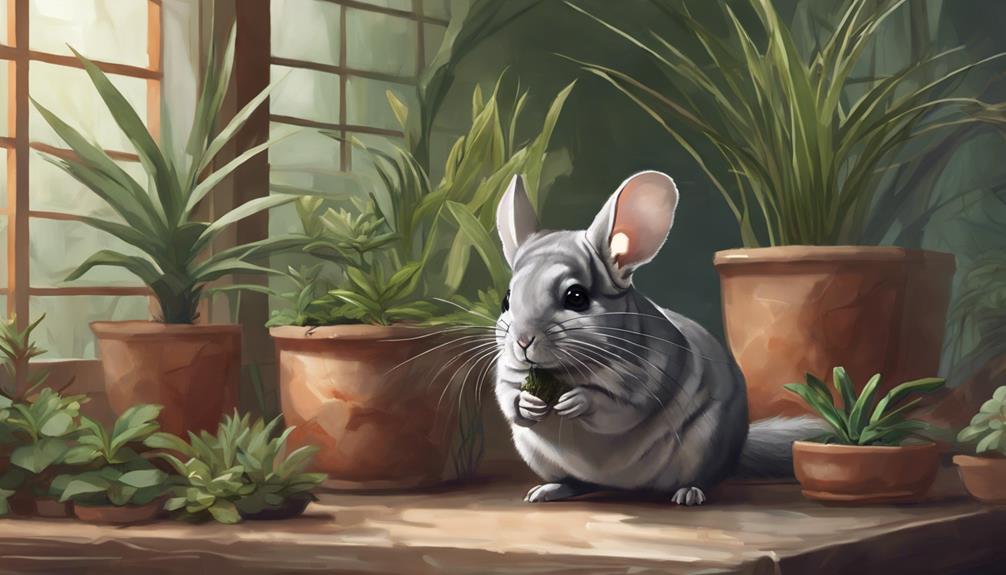What Plants Are Safe Around Your Chinchilla's Cage?

Here are some safe plants you can consider for your chinchilla's cage:
- Spider plants
- African violets
- Rosemary
- Mint
Remember to research each plant thoroughly before introducing it to your chinchilla's environment. Proper care and attention to detail will help create a safe and enriching living space for your furry friend.
Key Takeaways
- Safe plants like spider plants and mint are essential for chinchilla health and provide enrichment.
- Toxic plants like aloe vera and ivy can cause health issues, so avoid them near your chinchilla.
- Consider plant placement, soil safety, and research to ensure a chinchilla-friendly environment.
- Provide chinchilla enrichment with safe plants, soft bedding, hiding spots, and chew toys for well-being.
Plants Safe for Chinchillas
When creating a safe environment for chinchillas, it's important to carefully select plants that are non-toxic and suitable for their well-being. Plant selection plays a critical role in guaranteeing the health and happiness of these adorable creatures. Chinchillas enjoy nibbling on various greens, so providing safe plants is essential. Some suitable options include herbs like cilantro, parsley, and basil, as well as plants like rosemary, marigolds, and pansies.
To guarantee the well-being of chinchillas, it's essential to follow specific care tips when introducing plants into their environment. Always research plants before adding them to the cage to make sure they're safe for chinchillas. Additionally, wash all plants thoroughly to remove any pesticides or contaminants that could harm your furry friends. Monitor your chinchilla's behavior around the plants to ensure they aren't causing any adverse reactions.
Toxic Plants to Avoid
Some plants can pose a threat to chinchillas' health, making it important for owners to be aware of toxic species. Understanding the harmful plant species and knowing chinchilla-safe alternatives can help prevent potential health risks to these small pets.
It's essential for chinchilla owners to be cautious and informed about the plants they introduce into their pets' environment.
Harmful Plant Species
To safeguard your chinchilla's health, it is imperative to meticulously avoid incorporating any toxic plant species within their cage. Some plants can be harmful to these delicate creatures, causing potential health issues or even fatalities. Here is a table showing a few common toxic plant species that should be kept far away from your chinchilla's habitat:
| Plant Species | Toxic Parts | Symptoms |
|---|---|---|
| Aloe Vera | Leaves | Vomiting, diarrhea |
| Ivy | Leaves, berries | Abdominal pain, drooling |
| Daffodils | Bulbs | Nausea, tremors |
| Pothos | Leaves, stems | Oral irritation, swelling |
Being aware of these toxic plants and ensuring they are nowhere near your chinchilla's living space is critical for their well-being and enrichment.
Chinchilla-Safe Plant Options
In selecting plants for your chinchilla's cage, it's essential to steer clear of any species known to be toxic to these small mammals. When choosing chinchilla-safe plant options, consider the following:
- Plant Placement, Chinchilla Enrichment: Opt for plants that are safe for chinchillas to be around, ensuring they provide enrichment without posing any harm.
- Soil Considerations, Chinchilla Grazing Habits: Select plants that aren't only safe above ground but also consider the soil they're planted in, as chinchillas may nibble on them.
- Research and Consultation: Conduct thorough research or consult with a veterinarian to confirm the safety of any plant before introducing it to your chinchilla's living space.
Potential Health Risks
To keep your chinchilla safe and healthy, it's imperative to be aware of potential health risks posed by toxic plants that should be avoided in their living environment. Plant toxicity can have severe health implications for your furry companion.
Some common plants that are toxic to chinchillas include azaleas, daffodils, ivy, and tulips. These plants can cause symptoms ranging from mild gastrointestinal upset to more severe issues like organ damage or even death in extreme cases.
As a responsible chinchilla owner, it's essential to thoroughly research and make certain that all plants in and around your chinchilla's living space are non-toxic. By being vigilant and proactive in identifying and removing toxic plants, you can help safeguard your chinchilla's well-being and promote a safe environment for them to thrive in.
Easy-to-Grow Chinchilla-friendly Plants
With a bit of care and attention, you can easily cultivate chinchilla-friendly plants that thrive in your chinchilla's cage. These plants not only add a touch of greenery to the environment but also provide your furry friend with a safe and enriching space to explore.
Here are three easy-to-grow chinchilla-friendly plants to contemplate:
- DIY Planters for Herbs: Create DIY planters using recycled materials and plant chinchilla-safe herbs like cilantro or basil. These not only serve as a fresh snack for your chinchilla but also offer a pleasant aroma in the cage, enhancing their playtime.
- Hanging Spider Plants: Hang spider plants in the cage using hanging planters to create a dynamic environment for your chinchilla. These plants are safe and non-toxic, providing both visual stimulation and physical exercise for your pet, promoting chinchilla enrichment.
- Aloe Vera: Aloe vera, known for its healing properties, is a low-maintenance plant suitable for chinchilla habitats. Its spiky leaves add an interesting texture to the cage, and it serves as a safe option for your chinchilla to nibble on during playtime.
Indoor Plants for Chinchillas

Indoor plants can add a touch of nature to a chinchilla's living space, but not all plants are safe for these delicate creatures. Understanding the difference between safe indoor plants and toxic ones is important for ensuring the well-being of chinchillas.
Educating oneself about plant dangers is the first step towards creating a safe environment for these adorable pets.
Safe Indoor Plants
Lush greenery can add both aesthetic charm and a touch of nature's beauty to a chinchilla's living space. When choosing indoor plants for your chinchilla's environment, consider the following:
- Plant Care & Water Requirements: Opt for low-maintenance plants that don't demand frequent watering to guarantee a healthy and stress-free environment for your chinchilla.
- Plant Placement & Sunlight Exposure: Select plants that flourish in low-light conditions as chinchillas prefer dimly lit areas. Make sure the plants are securely out of reach from your chinchilla to prevent any unwanted nibbling.
- Natural Habitat Simulation: Choose plants that mimic the chinchilla's natural habitat, providing a sense of comfort and familiarity for your furry friend.
Toxic Plant Dangers
Caution must be exercised when selecting indoor plants for a chinchilla's living space, as some common plants can pose toxic dangers to these sensitive animals. It is essential to be aware of the potential hazards lurking in seemingly harmless greenery. Below is a table outlining some toxic plants to avoid around chinchillas, along with safer alternatives for creating a chinchilla-friendly garden.
| Toxic Plants to Avoid | Chinchilla-Safe Alternatives |
|---|---|
| Aloe Vera | Spider Plant |
| Ivy | Bamboo Palm |
| Pothos | Areca Palm |
| Philodendron | Parlor Palm |
Outdoor Plants for Chinchillas
Selecting appropriate outdoor plants for chinchilla cages requires careful consideration of their safety and suitability for the chinchilla's well-being. When creating a chinchilla garden, it's essential to choose plants that aren't only visually appealing but also beneficial for the chinchilla's health and happiness. Here are some outdoor plant options and chinchilla garden ideas to enhance your pet's living environment:
- Chamomile: This fragrant herb isn't only safe for chinchillas but also offers calming effects that can help reduce stress in these sensitive animals. Planting chamomile around the cage can create a soothing atmosphere for your chinchilla to enjoy.
- Dandelion: Chinchillas love dandelion leaves and flowers as a tasty treat. Planting dandelions near the cage allows your pet to nibble on these nutritious greens, providing both enrichment and a natural snack.
- Rosemary: This aromatic herb is safe for chinchillas and can add a pleasant scent to the outdoor area. Rosemary also has potential health benefits, making it a great addition to your chinchilla garden.
Low-Maintenance Chinchilla-safe Plants

Enhancing a chinchilla's environment with low-maintenance, safe plants can provide enriching elements to their living space without requiring excessive upkeep. When selecting plants for your chinchilla's habitat, it is important both the well-being of your pet and the ease of plant care. Here are some low-maintenance chinchilla-safe plants that can bring a touch of nature to your furry friend's living area while promoting chinchilla enrichment:
| Plant Name | Light Requirements | Watering Needs |
|---|---|---|
| Spider Plant | Low light | Moderate |
| Ponytail Palm | Bright light | Low |
| Air Plant | Indirect light | Light misting |
| Boston Fern | Indirect light | Regular |
| Peperomia | Low light | Low |
These plants not only require minimal maintenance but also provide a safe and engaging environment for your chinchilla. Remember regularly check the plants for any signs of wilting or pests to make sure your chinchilla's surroundings remain healthy and stimulating.
Benefits of Greenery for Chinchillas
To cultivate a thriving environment for chinchillas, incorporating greenery not only enhances their habitat but also contributes greatly to their overall well-being. Here are three key benefits of greenery for chinchillas:
- Natural Enrichment: Greenery provides natural enrichment by mimicking the chinchilla's natural habitat. It encourages exploration, climbing, and foraging behaviors that are essential for their well-being. Chinchillas enjoy nibbling on leaves and investigating different textures, which can help alleviate boredom and stress.
- Environmental Stimulation: Greenery offers environmental stimulation that's vital for a chinchilla's mental and physical health. It provides sensory experiences through scents, textures, and tastes, keeping the chinchilla engaged and active. This stimulation prevents lethargy and promotes a more fulfilling lifestyle for these curious creatures.
- Chinchilla Well-Being: Overall, incorporating greenery promotes chinchilla well-being by fostering a more dynamic and natural living space. It supports their natural behaviors and instincts, leading to happier and healthier chinchillas.
Frequently Asked Questions
Can Chinchillas Eat Any Parts of the Safe Plants, or Should They Only Be Used for Decoration?
When considering chinchilla nutrition and plant safety, it's essential to be cautious. Even safe plants may not be safe for consumption. Chinchilla health is paramount; avoid any risks of plant toxicity for their well-being.
Are There Any Specific Watering or Soil Requirements for the Chinchilla-Friendly Plants Mentioned?
In caring for chinchilla-friendly plants, consider soil composition for proper drainage and nutrients. Watering frequency varies depending on plant species, but generally, allow soil to dry out slightly between waterings to prevent root rot.
How Can I Protect My Plants From Being Accidentally Nibbled on by My Chinchilla?
To shield beloved greenery from curious chinchilla nibbles, consider chinchilla-proof planters or crafty DIY plant barriers. These safeguards not only protect plants but also grant chinchillas the freedom to roam sans plant snacking mishaps.
Are There Any Special Considerations for Using Indoor Plants Versus Outdoor Plants for Chinchillas?
When deciding between outdoor vs indoor plants for chinchillas, toxicity concerns should be paramount. Indoor plants may offer better control over what your chinchilla can access, while outdoor plants pose a greater risk due to potential exposure to harmful substances.
Are There Any Alternative Options for Providing Greenery for Chinchillas Aside From Live Plants?
Like a chameleon blending into its surroundings, chinchillas also enjoy greenery. To avoid toxic concerns with live plants, consider artificial alternatives. DIY planters or hanging solutions can provide a safe and decorative touch.











